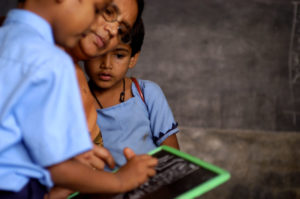
How global education will help solve the problem of child labor?
The modern world seems to be civilized, offers people everything they need for personal growth and development. Human rights organizations have long explained what freedoms we have and what things are intolerable in progressive society. At the same time, there are still many phenomena humiliating human dignity, in particular, child labor. Experts from Pro-Papers have written this article to give you a general idea of this problem and ways to address it with the help of education.
What is child labor?
Not all teenage jobs should be regarded as something bad and illegal. If work does not negatively affect person’s health, social status, academic activity and psychological state, one quite can earn pocket money, participate in parental business or pass internships. Hard-working young people striving for self-development, thinking about family welfare and their own future usually cause respect. Skills and experience acquired at part-time jobs may strengthen critical thinking and positive character traits, such as perseverance, patience, sociability, and foresight, come in handy in adult life, when making the first career building steps.
However, history knows much crueler forms of child labor. Some types of work deprive kids of childhood, undermine their dignity and potential, hinder mental and physical development, turn them into undesirables for their communities, deprive them of the opportunity to receive education, force them to drop out of school and earn money for living.
In its worst manifestations, child labor involves homelessness and surviving in the big, cruel world, coercion, enslavement, using kids for military conflicts, separating them from families, exposing them to hazards which may cause illnesses. Many children live this way from a very early age, grow into anti-social, intimidated individuals or, on the contrary, aggressive criminals.
A child may be kidnapped or exploited by one’s own parents. For example, some dysfunctional families offer their kids for prostitution and pornography, force them to produce and distribute drugs.
Education as a remedy for child labor
Since child labor prevents kids from receiving education, it is quite logical that education may help to address the problem of child labor. Academic knowledge is the antonym of low-skilled work. It is much harder to exploit young people aware of their rights and better life they deserve.
Private schools are mainly attended by children from rich families, while vulnerable ones do not have money to pay tuition fees and need governmental protection. The way out is seen in creating a universal state-operated system providing knowledge to everyone. Obliged to attend free public schools, young people will have no time for hard, low-paid jobs. Parents will be accountable to the state, have no possibility to exploit kids thus solving family financial problems.
Obligatory education should not boil down to acquiring basic writing, reading, and counting skills. The state should ensure that kids from dysfunctional families are trained holistically, can reach their full potential, receive knowledge and skills necessary to be competitive on the labor market and find a workplace with favorable conditions.
Being educated only at a primary level, young people would be doomed to settle for unprotected, low-skilled jobs. Moreover, researchers claim that basic numeric and literacy skills do not provide protection from child labor. That is why efforts should be focused on strengthening public secondary schools and spreading state resources to all social levels.
Here are the several steps to be made for expanding public education and withdrawing children from unfavorable, exploitative environment:
- First of all, the educational system needs quantitative changes: more well-trained teachers, classrooms, equipment, learning materials provided by the state will make it easier for schools to accommodate and care for children at risk. Since poor families often cannot afford textbooks, uniforms, educational trips, all costs, both direct and indirect, should be removed from parents.
- Special programs should be developed for young people living in rural areas and communities with mobile lifestyle. Some experts see a solution in online education. However, nobody can be sure that a learner reads textbooks and performs assignments instead of working. The lack of state control gives freedom to unscrupulous parents. Therefore, creating boarding schools in big cities seems to be a more reasonable way out. Kids may visit their families on weekends and live in dorms under teachers’ supervision on weekdays.
- Apart from formal education, there should be informal, free extracurricular sections systematically linked with a basic course. Kids will have more chances to define their academic preferences, develop natural talents and decide on career goals.
- Educators should support children re-entering school, develop individualized curricula depending on their knowledge level, allow over-aged kids to complete education.
- Children should receive relevant information on their rights and activities regarded as child labor, understand who may be asked for help and informed about exploitation. The truth is that many kids work from the early years and even do not know that they do it illegally, believe that it is their obligation to contribute to a family budget. It is very important to reach these vulnerable individuals and show them perspectives of a secure, happy life, the world in which they can preserve dignity and be respected.
Knowledge is light and ignorance is darkness. This phrase is true for the child labor problem. Systematic efforts in the educational sector should protect young people from dangerous, exhaustive work, ensure that they are not devoid of childhood with all its joys and opportunities.